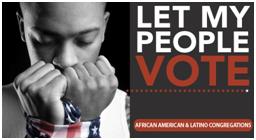Widgetized Section
Go to Admin » Appearance » Widgets » and move Gabfire Widget: Social into that MastheadOverlay zone
Hypocrisy or Democracy: Legacy of the Franchise in the U.S.
The views expressed are those of the author and do not necessarily reflect the views of ASPA as an organization.
By Brandi Blessett
March 4, 2016
During an election year, the American principles and ideals of fairness, justice and democracy are typically on display for all the world to witness. However, I would argue that during this presidential election cycle these principles have been undermined the most.
American politicians and citizens often espouse a theory of democracy where one person, one vote encompasses a value that permeates throughout the culture and society. However, theory in practice must acknowledge that disenfranchisement is as old as American democracy itself. The Constitution did not afford Black men the right to vote until the ratification of the 15th Amendment in 1870, while women did not receive the same privilege until 1920, almost 50 years later. Subsequently, although the franchise has been on the books for more than 100 years, states’ rights have sought to undermine the civil rights of nonwhite people.
For example, states have developed an array of strategies designed to limit access to ballot. In a previous study, I categorized disenfranchisement policies based on their ability to: cause financial hardships, create confusion, limit access to the ballot, dilute the vote geographically and use subjective measures of eligibility. In this regard, the relationship between federal and state policies is recognized as ‘scope of conflict’ whereby federalism can be used to protect citizens’ rights, but the latitude of state discretion enables the obstruction of civil rights policies and initiatives.
The Voting Rights Act of 1965 celebrates its 50th anniversary this year and it proved to be an effective strategy to address the institutional discrimination that prevented people of color from accessing the voting booth. However in 2013, the Supreme Court’s Shelby County v. Holder decision ruled that Section 4(b) was unconstitutional. Section 4(b) covered “states or political subdivisions” that required prerequisites for voting and had low voter turnout, with less than 50 percent voter registration. States included Alabama, Georgia, Louisiana, Mississippi, South Carolina, Virginia, 39 counties in North Carolina and one county in Arizona.
Although discrimination is less overt than it was in the 1960s, there remains a racially disproportionate impact with respect to how states have sought to silence people of color. Thus, while there are no longer poll taxes, voter ID laws have contributed to a financial hardship for many low-income persons of color. Literacy tests have been replaced with provisional ballots, both of which enabled poll workers to subjectively determine eligibility and access to polls.

During a presidential election year, when the principles of American democracy are on display for the world to see, states across the country seek to enact legislation that further marginalizes access to the ballot. The National Conference of State Legislatures (NCSL) is an organization that offers assistance (e.g., tools, resources and information) to state legislatures to help identify the best solutions to complex problems. NCSL’s website enables users to learn about policy trends, track the status of bills and identify resources for any of the 50 states, the District of Columbia and Puerto Rico. In reviewing policy trends from the NCSL website, it is evidenced that between 2001-2010 states passed 1,853 election reform laws, while 21 percent (391) of polices fell into one of five disenfranchisement categories: cause financial hardships, creates confusion, limit access to the ballot, dilute the vote geographically and use subjective measures of eligibility.
This is terribly troubling in a society that seeks to promote democracy abroad, while stifling it here at home. Gaynor and Blessett argued, “Within the context of American culture, social hierarchies exist in society and persist through contemporary manifestations of discrimination.” Therefore, it is important “to recognize the role of dominant perspectives and ideologies in dictating what groups will be given access to the rights and privileges of citizenship.” In this regard, political discourse and public opinions fundamentally inform policy decisions that seek to disenfranchise people of color who are deemed undeserving or unworthy of the vote. Furthermore, I would argue that much of the contemporary political rhetoric contributes to the stratification of the American citizenry, not toward galvanizing the country toward a meaningful identity. This systematic marginalization has tremendous implications for the individuals stripped of their ability to be decision-makers in and for their respective families and communities.
More importantly, when public institutions and administrators are complicit in such discrimination, the legitimacy of those structures and people rightfully come into question. I often wonder if public officials value the oaths they cite when they take office, or if administrators specifically have ever seen the ASPA Code of Ethics, whereby the principles of professional responsibility highlight:
1) Upholding the Constitution and the law.
2) Promoting democratic participation.
3) Strengthening social equity.
4) Promoting ethical organizations.
For large factions of the American public, democracy is an elusive hoax, justice is not blind and fairness is nonexistent. If this is truly the America we live in, let us all finally admit it. This could indeed be the first step toward progress!
Author: Brandi Blessett is an assistant professor in the Department of Public Policy and Administration at Rutgers University-Camden. Her research broadly focuses on issues of social justice. Her areas of study include cultural competency, social equity, administrative responsibility and disenfranchisement. She can be reached at [email protected].


 (2 votes, average: 4.00 out of 5)
(2 votes, average: 4.00 out of 5)
Follow Us!